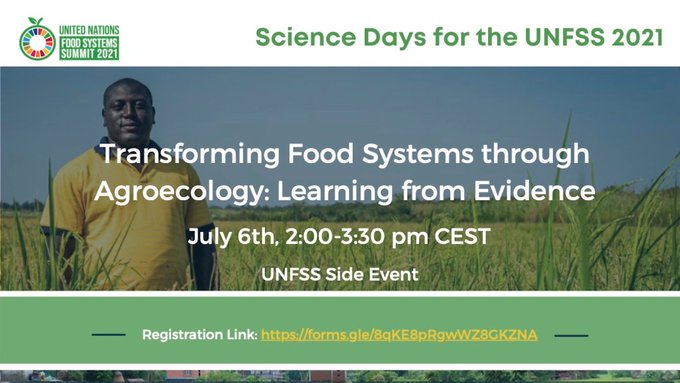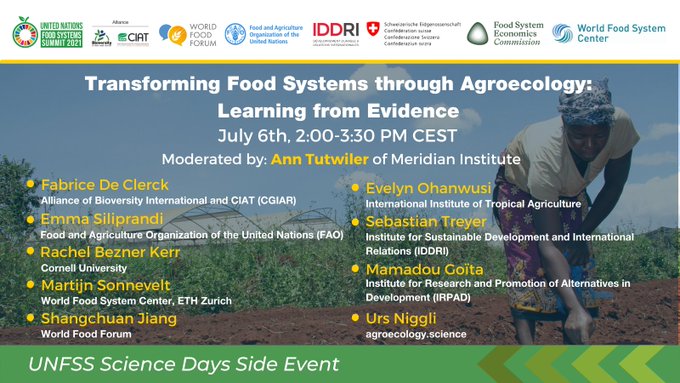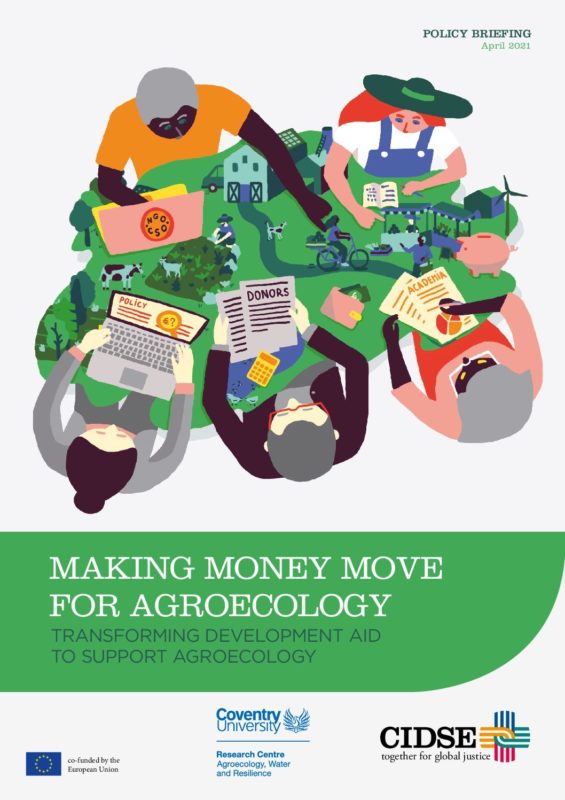There is increasing evidence that agroecology is a powerful strategy to reduce trade-offs between productivity and sustainability, and achieve market-driven compensation for positive externalities. One of its central characteristics is diversity. Although results are mixed and further research is needed, a positive relation between agricultural diversification and diversified diets, is true for many different farming systems.
This side event shared knowledge and evidence on agroecology, and identified and discussed knowledge and implementation gaps. Potential pathways and changes in framework conditions to foster diversity in knowledge systems, ecosystems and nutrition to allow for a sustainable food systems transformation was discussed.
- Moderation: Ann Tutwiler, Senior Advisor, Just Rural Transition and Senior Fellow, Meridian Institute
- Emma Siliprandi, Agriculture Officer, Plant Production and Protection Division (NSP), FAO
- Sébastien Treyer, Executive Director, Institute for Sustainable Development and International Relations (IDDRI)
- Urs Niggli, President, agroecology.science and member of the Swiss National FAO Committee World Food Forum (Youth group)
- Rachel Bezner Kerr, Professor, Department of Global Development, Cornell University
- Mamadou Goïta, Executive Director, Institute for Research and Promotion of Alternatives in Development (IRPAD)
- Fabrice De Clerck, Senior Scientist, Alliance of Bioversity International and CIAT (CGIAR)
- Martijn Sonnevelt, Executive Director, World Food System, ETH Zurich and President of the Swiss National FAO Committee
Shared resources:
It will be published for the UN Food Systems Summit (New York, September 2021)
- Part 1 -AGROECOSYSTEMS 1 - Increasing the efficiency of practices in order to reduce the use of costly, scarce or environmentally damaging inputs 2 - Substituting intensive use of external inputs with ecosystem functions provided by biodiversity 3 - Redesigning the agroecosystem on the basis of a new set of ecological processes from farm and landscape
- Part 2 - FOOD SYSTEMS 4 - Identifying and overcoming constraints within food systems for the deployment of agroecological transitions at scale, reconnecting producers and consumers 5 - Building a new global food system based on equity, participation, democracy and justice
- Part 3 - KEY PROCESSES, METHODS AND TOOLS FOR AGROECOLOGY
 Editorial and Scientific Board
Kwesi Atta Krah (IITA), Jean-Luc Chotte (IRD), Chantal Gascuel (INRAE), Vincent Gitz (CIFOR), Etienne Hainzelin (CIRAD),
Bernard Hubert (INRAE, Agropolis International), Marcela Quinteiro (Alliance of Bioversity International and CIAT) and
Fergus Sinclair (ICRAF) are the scientific coordinators of this publication, with the support of Isabelle Amsallem (Agropolis
International).
Editorial and Scientific Board
Kwesi Atta Krah (IITA), Jean-Luc Chotte (IRD), Chantal Gascuel (INRAE), Vincent Gitz (CIFOR), Etienne Hainzelin (CIRAD),
Bernard Hubert (INRAE, Agropolis International), Marcela Quinteiro (Alliance of Bioversity International and CIAT) and
Fergus Sinclair (ICRAF) are the scientific coordinators of this publication, with the support of Isabelle Amsallem (Agropolis
International).Terms of Reference / IIS Inception Report / Emerging Results brief
- This CoSAI’s study indicates that current reporting of agricultural investment data across all funding sources is very poor in terms of quality and granularity.
- The study concludes that adopting a standard for transparent reporting and measurement could, in itself, lead to “swift changes in funding patterns” towards sustainability goals.
- CoSAI has therefore initiated an international Taskforce on Principles and Metrics for Innovation which is a first step in this direction.
- Find out more about the innovation investment baseline study: https://wle.cgiar.org/cosai/innovation-investment-study
- Ahead of publication of the full report, read a brief detailing the emerging results from the study.
The Commission on Sustainable Agriculture Intensification (CoSAI) has joined a partnership to support development of the portal, with CoSAI Commissioner Uduak Igbeka invited onto the Portal Advisory Committee to help navigate strategic decisions. Created in part as a response to the COVID-19 pandemic, the IFSS portal builds on momentum leading up to the UN Food Systems Summit and related global initiatives this year.
In this policy briefing, launched during a webinar on 19 April 2021, CIDSE synthesised the findings from the research commissioned by CIDSE to Agroecology Now! on how we can ‘make money move for agroecology’. CIDSE made the case for reforming the way agricultural and food systems development is financed so we can achieve the transformations that we desperately need. Agroecology is the best approach to guide this transformation.
Bioversity International, 2017. Mainstreaming Agrobiodiversity in Sustainable Food Systems: Scientific Foundations for an Agrobiodiversity Index. Bioversity International, Rome, Italy. 180 pp.
This book summarizes the most recent evidence on how to use agrobiodiversity to provide nutritious foods through harnessing natural processes.
This book summarizes the most recent evidence on how to use agrobiodiversity to provide nutritious foods through harnessing natural processes.
- The complete book (10 MB)
- The book summary (3 MB) English I French I Spanish
- A 8-page brochure (2 MB) showcasing the main facts about mainstreaming agrobiodiversity in sustainable food systems




No comments:
Post a Comment